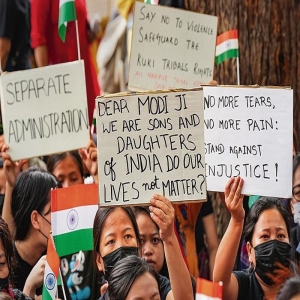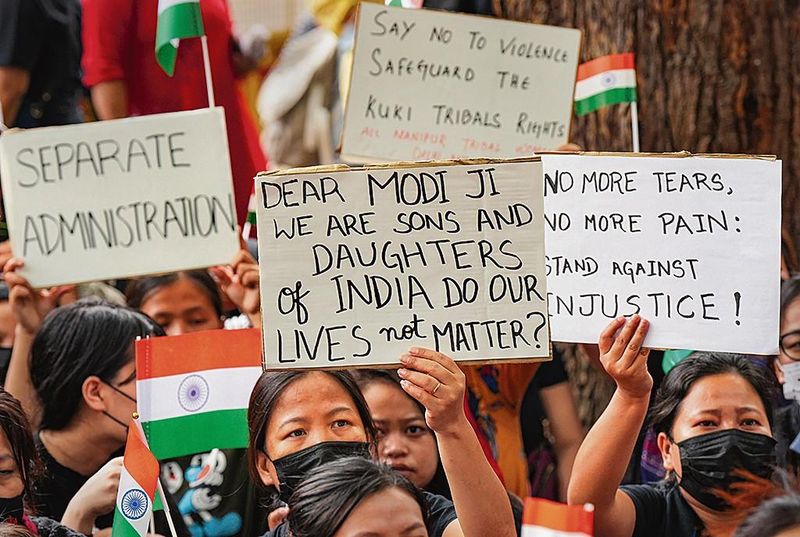

The air in Manipur is thick with the scent of burning homes. The streets, once vibrant with shared laughter and festivals, are now splattered with the blood of brothers turned enemies. Families lie awake in refugee camps, their eyes reflecting the flickering light of a land they no longer recognise. When did this happen? How did we go from living as neighbours, buying rice from the same market and attending the same schools to hunting each other in the hills and streets of our own home? The more we think about it, the more one thing becomes clear: this war is not ours. This hatred was planted in us, and we have watered it with our blood.
We—Meitei and Kuki alike—are playing a game designed for our defeat. Our homes are burning, our people are dying, our futures are vanishing before our eyes, and yet, somewhere far away, men in suits sit in air-conditioned rooms, watching the numbers. How many of us are dead today? How much weaker is Manipur? How much easier is it to control people who cannot even stand with each other? They smile because every bullet that flies between a Kuki and a Meitei serves the same purpose: to keep Manipur divided, to keep the Northeast weak, and to make sure that we are too busy bleeding to ask the real questions.
What do we really get out of this war? Have we gained anything in this bloodbath? Our people are dying—not theirs. Our land is being divided—not theirs. Our future is being rewritten with the ink of fear and hatred—not theirs. Yet, the dominant narrative pushed by the Indian mainstream media describes the conflict as an "ethnic clash," a continuation of "age-old enmities." But is that really the case? If the Meitei and the Kuki had been irreconcilable enemies for centuries, why do we find historical records of peaceful coexistence? Why do we see intermarriages, shared festivals, and joint resistance against external forces?
Ask your grandparents if they ever saw Manipur like this. Ask them if they remember a time when the Meitei and Kuki people lived together, traded, married into each other's families, and fought against the forces that tried to control them. They will tell you the truth: this hate is new, and it was never ours to begin with.
If the conflict were truly ancient, why did Meiteis and Kukis trade together for centuries? Why did they fight together against British colonial forces in the Anglo-Manipur War of 1891? Why did Kuki warriors and Meitei rebels both resist Indian annexation in the late 1940s? Why did these divisions only deepen post-1947? Who profits from portraying this as an inevitable war between two peoples who have more in common than what separates them?
Look at history. "Divide et impera" – divide and rule – has been the most effective tool of colonial powers throughout history. The British perfected this strategy, drawing lines between Hindus and Muslims, between castes, and between tribes, ensuring that no one could unite against them. This same method was used in Northeast India, where arbitrary divisions were created, boundaries were redrawn, and a policy of controlled chaos was introduced to prevent unity among indigenous communities.
When the British left, did this strategy disappear? Or did the new rulers in Delhi find it just as useful?
In Manipur, colonial policies first institutionalised ethnic divisions by categorising hill tribes separately from valley dwellers, assigning different administrative policies to each. The Indian state did not dismantle these colonial structures—it reinforced them. The Armed Forces (Special Powers) Act (AFSPA), the militarisation of the Northeast, and the selective patronage of some groups over others—these are all continuations of the same old strategy. And each time tensions start to ease, a fresh conflict mysteriously erupts. Is this just a coincidence?
Realist political theory tells us one thing very clearly: power does not operate in a vacuum. Every war, every riot, every act of violence has a beneficiary. So, if we—Meitei and Kuki—are both losing, then who is winning? The answer is simple: those who have always profited from our suffering. The mainland politicians who now have a justification to increase military control in Manipur. The more violent Manipur becomes, the more the state can justify its repressive actions in the name of "national security."
Manipur, like the rest of the Northeast, is rich in natural resources. But as long as the land is soaked in blood, local people are too disempowered to resist corporate exploitation of their forests, minerals, and water sources. The policymakers in Delhi can now push their agendas without fear of a united resistance from the Northeast. Do you really think it is a coincidence that this violence erupted just as questions of autonomy, identity, and political representation were gaining momentum? Do you really believe this is just an accident?
Notice the timing. The latest explosion of violence in Manipur did not come out of nowhere. It erupted just as discussions of greater autonomy and self-determination were gaining traction, Indigenous identity movements were gaining momentum, and people in the Northeast were starting to unite and demand accountability from Delhi.
If this was truly a historical blood feud, why didn't it erupt decades ago? Why now, when the Northeast is beginning to organise and resist? Political theorist Noam Chomsky once said, "The smart way to keep people passive and obedient is to strictly limit the spectrum of acceptable opinion, but allow very lively debate within that spectrum." In Manipur, they have created an even smarter method: limit unity but allow lively violence within that spectrum.
The very idea of Kukis being reduced to "tribals" or making Meiteis fight for this artificial identity is an insult to our rich history. We had our own kingdom—Kangleipak—long before India existed as a modern nation-state. Kangleipak was the jewel of Southeast Asia, a thriving and powerful civilisation. Why, then, does India insist on boxing us into an artificial tribal construct? This is not accidental—it is a deliberate strategy to diminish our historical legacy, to make us believe we are mere fragments instead of the sovereign people we once were. Even the United Nations acknowledges that Indigenous people cannot be simplistically labelled as "tribal"—it is a colonial relic designed to belittle and control. Meitei and Kuki—our histories, our struggles, and our identities are intertwined. Why, then, must we be divided using these fabricated labels?
They want us to fight. They want us to bleed. They want us to see our brothers as enemies. Because a divided Manipur is a controlled Manipur. A divided Northeast is a voiceless Northeast. They have done it to Nagas. They have done it to Assamese. They have done it to Bodos. They are doing it to us. And if we let this continue, we will disappear just like so many of our ancestors whose stories have been erased from history books.
So, to both Meiteis and Kukis- please do not expect more or demand the leaders in Delhi to speak for you! You are nothing but pesky ants to them, who have to be eliminated and removed to create a path for resource extraction. They have never cared for you in the past, and they will not now. You think they will show brotherhood based on religion- well, think again. Have you forgotten how they treat you all once you enter Delhi? So why, then, are you shocked by the silence of these leaders?
They tell the Meitei people that the Kukis are outsiders. They tell the Kukis that the Meiteis are oppressors. They whisper lies in our ears until we are ready to slit each other's throats, and then they watch from afar, untouched, their hands clean while ours drip with the blood of our own people. Are we so blind that we cannot see the strings controlling us? Are we so foolish that we cannot recognise the same old tricks being played on us once again?
And mark our words, when the dust settles, when we have reduced ourselves to ash, they will come again with promises of peace. They will build military bases where our homes once stood. They will write the history books that our children will read, telling them that the Meitei and the Kuki have always been enemies, that this war was necessary, and that Delhi "saved" us from ourselves. They will do what they have always done: rewrite history in their favour, erase our voices, and move on to the next conflict.
And when we point this out, the adults reading this will shake their heads and call us "brainwashed"—by the "evil Kukis" or the "evil Meiteis." And to those adults who will definitely dismiss us as "brainwashed"—as fools who don't understand history—ask yourselves, who are the real fools? Because today, it seems like we, the children, have more sense than the so-called grown-ups, who are too busy slaughtering their own to realise they are nothing but puppets on someone else's strings. You burn down homes, kill us children, destroy our future, burn our schools, make us hate each other and then justify it with empty slogans about revenge. You think you are warriors, but you are puppets. And when there is nothing left of Manipur but ruins, you will be the ones sobbing over what you lost—not us. We will be the ones writing the history that tells the world exactly how blind and foolish you grown-ups were.